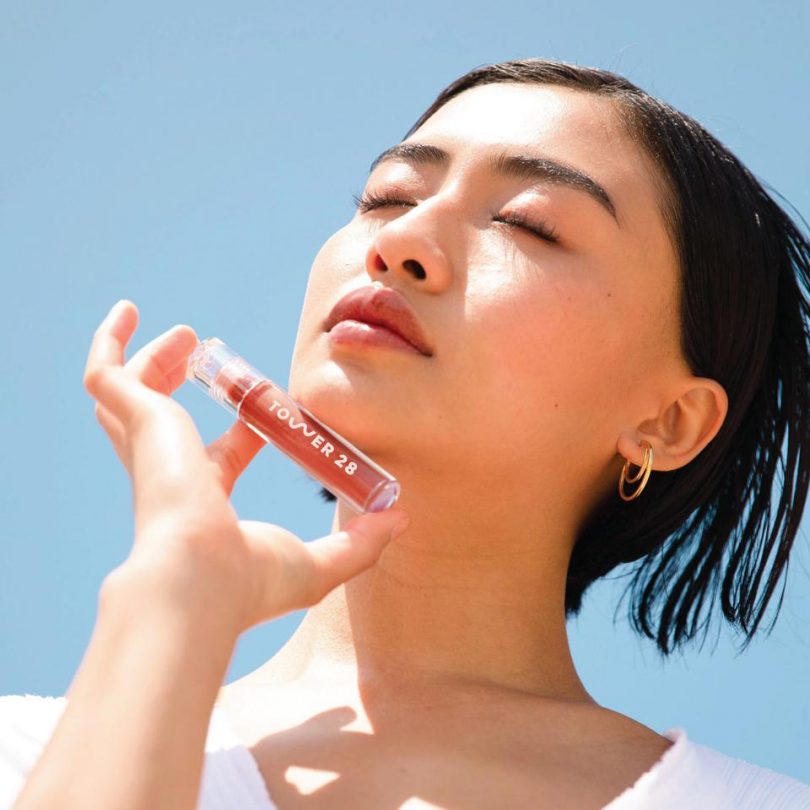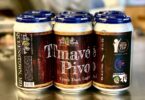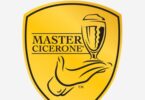Winged eyeliner, gua sha stones, eyebrow threading—the Western adoption of Asian beauty rituals is not just limited to the Korean beauty (K-beauty) face masks that line the makeup aisle at your local drugstore. Whether it’s following a 10-step K-beauty skincare routine or opting for the minimalist approach of J-beauty, Asian beauty practices have an undeniable influence on American’s skincare, scent and makeup choices today.
Asian-owned beauty brands are boldly calling out anti-Asian racism—Tower 28 raised almost $25,000 … [+]
As politicians, celebrities and beauty experts around the world make calls to support Asian-owned businesses in the face of anti-Asian racism, we’re reminded of the importance of recognizing Asian contributions to the beauty space. “The Asian community has provided endless inspiration and consumer dollars to the beauty industry. Any beauty company should recognize how important this community is and show support during this difficult time,” Priscilla Tsai, founder of Cocokind, tells Forbes. “If you are comfortable taking our dollars, you should feel the responsibility to stand up for us too.”

« Being Asian has inspired so much of what I do in my job, both in terms of the values it has … [+]
Motivated by a desire to help others feel seen where they didn’t growing up, many Asian beauty entrepreneurs are setting the standard for a more inclusive beauty space; highlighting the diversity within the Asian community too. “There are people all over the world, of Asian descent and beyond, that feel underrepresented in the beauty industry,” Deepica Mutyala, the founder of inclusive beauty platform Live Tinted, tells Forbes.
“When there’s a lack of representation it can be extremely discouraging and isolating, and leads to unrealistic and exclusive standards of beauty,” says Sarah Lee, co-CEO of Glow Recipe, telling Forbes the beauty company strives to hire models of diverse skin tones. Their efforts are representative of a larger movement that Mutyala describes “is shifting beauty industry standards to be more inclusive and diverse.”

« I have vivid memories of the powder never matching my skin tone—it was always lighter, » Deepica … [+]
These entrepreneurs believe gatekeeping hinders everyone. “Inclusivity makes us stronger, the beauty industry has room for all of us. It is extremely important that we continuously celebrate those who have been underrepresented and make our voices heard,” says Tsai. The hope is that a commitment to representation, that goes beyond the performative advertising for optics, will normalize diversity. “It’s important to reach the point where ‘representation’ is no longer a buzzword—it’s just a normal part of a brand’s DNA,” says Mutyala.

Believing inclusivity benefits everyone, Asian entrepreneurs are calling for beauty brands to take … [+]
Metta Murdaya, CEO of JUARA highlights the importance of representation too, “By being taken seriously as a contributing and consuming segment (as brand owners, professionals and consumers,) Asian voices will be heard more and can make the difference required to even the playing field.”
From purple eyeliner containing Indian kajal to Japanese pearl-infused eczema treatments, the following brands draw inspiration from the diversity of beauty rituals practiced across Asia. With high quality products for every skin condition and shade, they’re proving that inclusivity and innovation go hand-in-hand.

Hero Cosmetics’ cult-favorite Mighty Patch was inspired by the hydrocolloid acne patches Ju Rhyu … [+]
Battling pesky pimples and sensitive skin for years, it was only when Ju Rhyu discovered hydrocolloid acne patches after moving to Seoul, South Korea, that she found relief. Determined to bring the solution to North America, she created the Hero Cosmetics Mighty Patch. It was such a hit, she’s since expanded to an entire line of simple, blemish-fighting formulas. From maskne to dark spots to that one pimple that just won’t go away—Hero Cosmetics heals by swapping chemical solutions for restorative ingredients like hyaluronic acid, witch hazel and green tea water.

« I was always drawn to beach culture, but never saw myself represented, » Amy Liu tells Forbes on … [+]
“Growing up in California, I was always drawn to beach culture, but never saw myself represented—this world was overwhelmingly blonde, white and tan,” founder Amy Liu tells Forbes. And so, after 15 years of working for big names in the beauty industry, she created her own clean beauty brand named after the L.A. lifeguard tower she sees as a “symbol for inclusivity and clean living.” Liu certainly takes inclusivity and clean living seriously: not only is everything vegan and designed for all skin tones, but last month Tower 28 raised a total of $25,000 for the StopAsianHate movement. This year marks the second run of their Clean Beauty Summer School in support of Black small businesses.

The Tatcha Silk Powder harnesses the power of Japanese Pearl to absorb oil and protect the skin from … [+]
Green tea, rice and algae—essential ingredients of the Japanese diet and traditional geisha beauty rituals—are the foundation for Hadasei-3, the signature formula at the heart of Tatcha products. Founder Victoria Tsai grew up influenced by her Taiwanese American parents but it was a trip to Kyoto that impelled her to create a holistic, natural beauty line that pays homage to Japanese craftsmanship with products like an antibacterial powder brush featuring a Japanese kiri wood handle and a facial powder made with silk and Japanese Pearl.

Superegg founder Erica Choi recognizes the role of eggs in ancient Asian skincare rituals with vegan … [+]
From the facial creams used in 600 B.C. China to the egg serums of the Korean Joseon Dynasty, eggs have played a central role in Asian beauty practices since the first millennium. But it was growing up witnessing the use of eggs in beauty rituals at home and at the local Jjimjilbang (the Korean sauna), that inspired Erica Choi to create Superegg. “The yolk was used to moisturize, the whites to firm and the eggshell membrane as a rejuvenating mask to help with dark spots and collagen production,” Choi tells Forbes. Today, her clean skincare line matches each of the egg’s component with a vegan version to restore the skin to an egg-like complexion.

« We want to pay homage to our Asian roots with integrity and authenticity, » co-founder Kiku … [+]
Inspiration for Indian American sisters Shaz and Kiku Chaudhuri’s natural haircare line comes their grandmother, who they watched craft beauty remedies with herbs and flowers from her garden while growing up. “These formulas have been passed down by generations of South Asian women for centuries, the focus is proactive and preventative care harnessing the power of plants,” co-founder Kiku Chaudhuri tells Forbes. “From our supply chain to the knowledge we share with our community, we want to pay homage to our Asian roots with integrity and authenticity.” With plant-based formulas like the popular Scalp+Hair Prewash made with 25 Ayurvedic herbs and oils—Shaz & Kiks are doing just that.

« I understand what it feels like to believe I’m not good enough because I’m Asian,” Wyld founder Joy … [+]
From camellia oil to moringa seeds to konjac—Wyld’s Asia Pacific-inspired ingredients come from the skincare rituals Joy Yap witnessed while living in Singapore, Malaysia and Australia. Now she’s sharing her global knowledge in North America with Wyld—an acronym for ‘What You Love Doing.’ “As an Asian minority who lived in Australia and Canada, I understand what it feels like to believe I’m not good enough because I’m Asian,” Yap tells Forbes. Believing the white-centered nature of the beauty space is as toxic as the chemicals we put on our skin, the entrepreneur is determined to spread radical self-love with clean products that embrace all faces.

Ellis Brooklyn is carving a space for Asians in the fragrance industry; their latest Bee Eau de … [+]
“There are very few Asians working in perfumery, much less Asian Americans. On top of that fragrance is still very much dominated by men, so being a female founder was another challenge,” Bee Shapiro tells Forbes. Six years since launching, and Shapiro continues to defy the status quo by setting the standard for clean fragrance production with her paraben- and phthalate-free line. The latest innovation? Bee Eau de Parfum, a dark and complex fragrance designed with Asian master perfumer, Loc Dong.

Deepica Mutyala designed the brand’s signature Huestick after hearing common complaints of … [+]
“As a little girl, I remember wondering why there was no one that looked like me in the media,” Deepica Mutyala tells Forbes, “I felt unseen.” So in 2015 she created a YouTube video teaching Indian women how to cover dark under eye circles with red lipstick. The video went viral, motivating Mutyala to start the Live Tinted platform for open conversations about beauty; “we always want to be a space where every shade can come and share their story and be heard,” the founder says. Hearing frequent complaints of hyperpigmentation, Mutyala created their signature product the Huestick: a color corrector that doubles as an eyeshadow, blush and lipstick. Now, Mutyala is bringing her eye for inclusive beauty to fashion with the Be Seen collection designed in collaboration with JustFab.

With industries so deeply tied to our culture and society, it is important we see accurate … [+]
After moving from South Korea to New York City in the 1990s, Jin Soon Choi quickly became known as “Bicycle Jin” as she biked around the city offering personalized services to celebrities, designers and editors alike. Today she’s known for JINsoon, the expansive nail care line coveted for its 10-free, quick-drying formulas. From the Korean citron tea and Korean bathhouse-inspired pedicure treatments offered at her New York salons, to her nail box sets decorated by Korean artists Nanaan and Hyang Sook Yun—Choi honors her Korean heritage in every area of the brand.

Cocokind celebrates ingredients from across the Asian continent with products like the best-selling … [+]
For Priscilla Tsai, inspiration for her freshly packaged, sustainable skincare line came from witnessing her Taiwanese immigrant parents humble determination, not to mention her mom’s elaborate, multi-step skincare routine. “Before I was 16 years old, I already knew so much about skincare simply from watching my mom’s habits!” The founder tells Forbes. From Japanese fermented rice wine sake to antioxidant-rich matcha tea powder—Tsai continues to pay homage to her Asian roots by filling her products with some of the most nourishing ingredients found across the Asian continent.

What started as a soap-making project at home, has since grown into an expansive line of small … [+]
What started as an at-home soap-making project, has since grown into a full line of non-toxic, gender-neutral products that celebrate the planet (think, juniper carrot seed facial oil and rosemary avocado shampoo bars). Taking a slow food approach to skincare, the vegan apothecary nourishes with organic raw plant oils and steam-distilled and cold-pressed essential oils, all without animal-derived ingredients. Aptly named after co-founder Jeff Kurosaki’s two cats and bird, recycled packaging features Kurosaki’s charming illustrations.

The success of beauty brand Glamnetic has landed founder Ann McFerran on Forbes 30 under 30 List.
First-generation Thai immigrant Ann McFerran was on the path to becoming a doctor after graduating from the University of California, but her passion for lashes put that plan on hold. Frustrated with the lack of quality easy-to-apply magnetic eyelashes in the beauty space, she decided to make her own in 2019. The decision paid off—the chic line of lashes, liners and nails is on its way to reaching $100 million in sales this year and has landed McFerran on Forbes 30 under 30 List.

Knours products are designed to address the unique skincare issues associated with menstruation, … [+]
After 15 years of treating women in hospitals as a physical therapist, and her own experience with maternity and menopause, Julie Parks realized the crucial connection between skincare and hormonal health. Her Korean American heritage inspired her to employ K-beauty innovation in designing a line of clean products free of hormone-disrupting chemicals. From menstruation-induced hormonal acne to loss of elasticity during menopause—each Knours collection is specifically tailored to the conditions associated with the various cycles of menstruation, maternity and menopause.

Juara Skincare is inspired by Jamu—the ancient Indonesian practice of using natural ingredients to … [+]
What began as Metta Murdaya sharing healing traditions from her native Indonesia with three of her friends, has since grown into an entire skincare line based on Jamu—the Indonesian practice of using natural ingredients to heal, that Murdaya says has been around for thousands of years. “Representation beyond exotification and tokenism is what we aim for, and slowly it’s getting there,” the co-founder tells Forbes. “It’s been a continued education process, to get the beauty industry to recognize there are many approaches to self-care and beauty that come from other cultures—ours is one that highlights this.”

Coveted celebrity makeup artist Patrick Ta is making sure no one feels unseen like he did when he … [+]
The Hadid family, the Kardashians, Chrissy Teigen—Patrick Ta has developed a devout celebrity client base for his unmatched skills as a makeup artist. But it’s his passion for uplifting others that has catapulted him to beauty guru status. Growing up being bullied for his Vietnamese heritage by his predominately white classmates, Ta knows what it’s like to feel unseen. He’s determined to make sure no one feels like he did with his extensive line of beauty products designed to make everyone glow—regardless of their race or gender.

The tea culture of Arpeeta Oberai’s native India served as inspiration for the Beauteani line of … [+]
The idea for this thirst-quenching line of face masks was born in India, where Arpeeta Oberai discovered the rejuvenating power of tea and herbal remedies after leaving her job at Sephora to travel the world. Each of the four mask sets contain a gel and powder made with botanicals like black currant and cranberry, to be mixed into a paste and applied to the face—making for a complete self-care ritual when paired with the brand’s corresponding herbal teas.

In response to the surge of anti-Asian racism, Glow Recipe founders Sarah Lee and Christine Chang … [+]
What began seven years ago as two friends—Sarah Lee and Christine Chang—sheet masking to unwind one night has since grown into a cult-favorite K-beauty brand. The multi-million dollar business is using their global platform as a safe space for people of all shades to feel seen. “We’ve not only strived to hire models of diverse skin tones and textures for our campaigns, we’ve also been very cognizant of language,” co-founder Lee tells Forbes. “Recently we committed to no longer using terms such as poreless or flawless to help normalize these aspects about skin.” From watermelon niacinamide dew drops to avocado retinol eye masks—everything is fruit-based, free of toxins and wrapped in pretty recyclable packaging.

Kulfi founder Priyanka Ganjoo promotes inclusive beauty with the “Nazar No More” collection of … [+]
Named after the Kulfi ice cream founder Priyanka Ganjoo would eat on hot summer days in India, this eyeliner company is all about empowering South Asian women. Born from a desire to see herself reflected in the beauty community, Ganjoo designed the “Nazar No More” collection to encourage redefining beauty on your own terms. It consists of five eyeliners (shades ranging from terracotta to blue) made with kajal—a traditional ingredient commonly used in South Asian beauty products.

Cat Chen created Skylar out of a desire to hold the fragrance industry to the same clean beauty … [+]
Witnessing her immigrant Taiwanese parents pursue the American dream, Cat Chen grew up believing “anything is possible with perseverance.” For her, overcoming the impossible meant filling a void she witnessed in the beauty space: holding the fragrance industry to the same clean beauty standards she saw applied to skincare and cosmetics. With scents evoking the qualities of a clear day—like Capri and Vanilla Sky—the Skylar line is a breath of fresh air, literally; everything is free of parabens, phthalates, animal-derived ingredients and synthetic dyes.

The Venetian rose blush is the latest release from Michelle Phan’s beloved Em Cosmetics.
As one of the first YouTube beauty influencers and the co-founder of monthly beauty subscription service Ipsy—Michelle Phan is always ahead of the curve when it comes to makeup. The Vietnamese American gives her community (which has grown to 2 million on Instagram and nearly 9 million on YouTube) the tools they need to express themselves creatively with EM Cosmetics—a chic line of products designed for all experience levels. The latest? A blush-meets-eyeshadow in a warm Venetian rose hue.

Redmint takes a holistic approach to skincare grounded in Traditional Chinese Medicine.
After years of battling chronic stress and exhaustion, founder Helina Fan was so impressed by the healing effects of acupuncture and herbal remedies from her native China, that she created an entire skincare line based on Traditional Chinese Medicine. Topical plant-based treatments made with ingredients like lotus flower and pearl powder are combined with herbal extracts to take internally for a holistic approach that treats the skin from the inside-out.

Beauty guru Charlotte Cho tells Forbes her Then I Met You go-to’s are the Soothing Tea Cleansing Gel … [+]
“Living in Korea, I was inspired by the skin-first philosophy, which is about getting to the root of your skin conditions instead of covering them up with makeup,” founder Charlotte Cho tells Forbes. Cho builds off the less-is-more approach of her first beauty company, Soko Glam, with Then I Met You—a sustainable, clean beauty brand based on the Korean concept of “jeong” (which emphasizes empathy and meaningful connections). Describing herself as an “avid fan of double cleansing,” Cho’s go-to’s include the Soothing Tea Cleansing Gel, made with natural ingredients like sea buckthorn oil and licorice root, and the Living Cleansing Balm, the winner of over 12 industry awards.

Peach & Lily formulas are informed by Alicia Yoon’s experience with eczema and over a decade … [+]
“Growing up immersed in the rich Korean beauty heritage indelibly shaped my approach to skincare and led me to founding Peach & Lily—a consciously crafted skincare brand fuelled by Korean beauty innovations,” says Alicia Yoon. From a calming face mask made with lilac extract to moisturizer containing snail mucin and strawberries, Yoon combines her experience working as an aesthetician in both South Korea and New York City with her own eczema struggles to design formulas that make you glow.

“Métange is based on the concept that we all have the ability to self-heal,” founder Tanya Riz Tan … [+]
After finding relief from persistent facial swelling caused by an autoimmune disease with the Traditional Chinese Medicine practice of gua sha, Tanya Riz Tan created the Métange Obsidian Gua Sha stone to help others heal too. “Métange is based on the concept that we all have the ability to self-heal,” Tan tells Forbes. “When I was hospitalized for my autoimmune disease my daily skincare routine brought me so much emotional healing. It’s a concept I think especially resonates now during the pandemic—self-ceremony, making space for ourselves to feel seen, to take our power back through self-healing.”

Fable & Mane formulas—like the hair oil made with Ashwagandha—pay homage to Indian Ayurvedic … [+]
In search of stress-relief, co-founder Nikita Mehta returned to her roots by revisiting her grandmother’s practice of hair oiling—the Indian tradition of massaging the head with plant oils. Inspired by the transformative effects of this self-care ritual, she partnered with her beauty marketing expert brother, Akasha Mehta, to create a haircare line based on Ayurvedic beauty traditions. From turmeric and tiger herb-infused shampoo to hair oil made with Ashwagandha—their formulas restore stressed tresses (and minds) with potent, sweet-smelling Indian ingredients.

Acaderma founder Dr. Shuting Hu is one of the youngest cosmetic scientists awarded by the … [+]
This clean beauty brand takes science seriously: founder Dr. Shuting Hu—one of the youngest cosmetic scientists awarded by the International Federation of Societies of Cosmetic Chemists—has teamed up with scientists, dermatologists and professor Dr. James Simon to design a cosmeceutical line based on skin biology and plant chemistry. With ingredients sourced from all over the world (think, cactus and Norway Spruce), rigorously tested using green technology—the sustainable line is as clean on the skin as it is on the environment.
Some interview responses have been edited for clarity and length.








